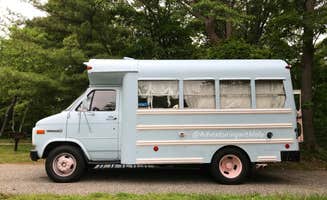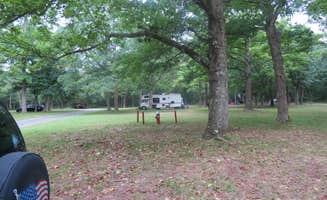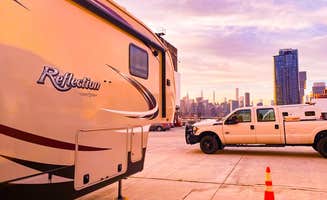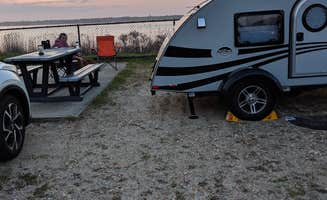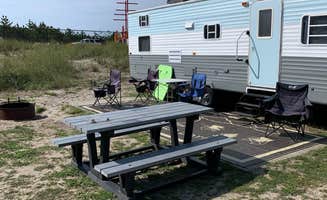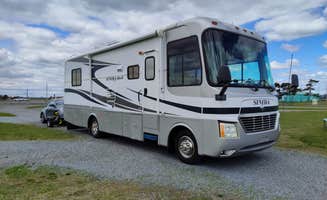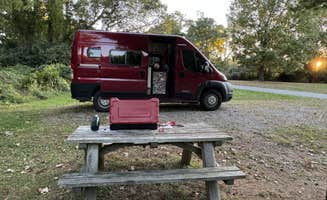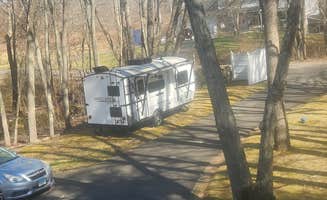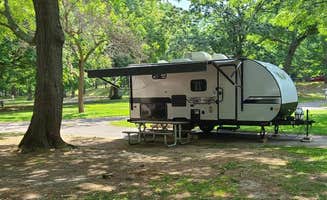Camping sites around Fort Salonga offer diverse experiences within Suffolk County's mixed woodlands and coastal areas. Most public campgrounds in the region sit at elevations under 100 feet, providing flat, accessible camping with minimal hiking required to reach sites. Winter temperatures typically drop to 20-30°F, while summer camping can expect humid days with temperatures reaching 85-90°F.
What to do
Beach exploration at Smith Point: Walk directly from campsites to both ocean and bay at Smith Point County Park. "A short walk from the ocean to the bay, both accessible by walking from your campsite. No shade so be prepared to wake early if you're in a sweltering tent," writes Ali O., highlighting the easy beach access that makes Smith Point County Park popular despite its exposed sites.
Hiking at Fahnestock: Access multiple trail systems including sections of the Appalachian Trail. "There is another lake and two ponds that our neighbor campers said were great for catching panfish - one fisherman said he had caught several bass weighing over 3 pounds," notes a reviewer at Clarence Fahnestock State Park Campground, which offers varied fishing opportunities beyond just hiking.
City excursions: Use campgrounds as bases for Manhattan visits. "This is a prime location for visiting the city or heading down the shore. The light rail is a block away, and the path train is about 8," explains Joe R. about Liberty Harbor, noting its strategic position for urban exploration while maintaining a campsite base.
What campers like
Overnight deer sightings: Many Suffolk County parks have resident wildlife. At Smith Point, one camper mentions, "At nite an ice cream truck comes by, you get visits from the nearby deer. It is paradise." These natural encounters provide unexpected camping highlights for urban visitors.
Waterfront views: Several campgrounds offer direct water frontage. "Stayed on the bayside (site 30), which had a fantastic direct bay view. Although most sites have views of the bay, some are blocked by seagrass," reports Gianna at Smith Point County Park, showing how site selection affects experience quality.
Seasonal beach access: After summer crowds leave, campgrounds offer private beach experiences. At Harriman State Park, one reviewer enjoyed "a lifeguard monitored sandy beach which is open during the summer season for swimming, fishing, and small boat craft further out," demonstrating the recreation options available to campers at Beaver Pond Campground.
What you should know
Security but limited quiet: Campground oversight varies across locations. At Beaver Pond, Steve W. notes: "Welcome to Bear Mountain grumbles the park ranger as he sits in complete darkness... Quiet time at night is laughable as the enjoyment of being in nature rages on into the early morning." This reflects the sometimes noisy atmosphere at popular campgrounds.
Reservation requirements: Many parks require advanced booking, especially Suffolk County parks. Tim M. points out that Smith Point has specific restrictions: "1- YOU HAVE TO BE A RESIDENT OF SUFFOLK CO, NY 2- ONE WEEK STAY AT A TIME. PERIOD." These residency requirements limit access for non-locals.
Facility quality varies: Bathroom cleanliness differs significantly between parks. One reviewer at Heckscher State Park Campground observed: "While the bathroom building itself is in decent shape and has a large amount of toilet stalls and about five showers, the condition of women's room was absolutely ghastly inside," highlighting inconsistent maintenance at some locations.
Tips for camping with families
Playgrounds on-site: Several campgrounds have dedicated play areas. "The playground is new and centrally located. They also have a horseshoe pit," notes a reviewer at Battle Row Campground, making it suitable for families with active children needing structured play options.
Site privacy considerations: Select sites carefully for family needs. At Battle Row Campground, Michael M. shared: "Each site is set back off a common area so there is plenty of privacy. It's great if your local easy in and out," highlighting the benefit of having semi-private family spaces.
Open field camping: Some campgrounds offer field camping suitable for group activities. Thorin J. describes Heckscher: "My site had good shade coverage and was free of rocks and other hazards. I had enough space that I didn't feel like I was intruding on my neighbors," showing how even open fields can provide adequate space for families.
Tips from RVers
RV site leveling: Select sites with care due to uneven terrain. At Cathedral Pines, one camper found "Wooded sites are lovely. RV sites in large field," indicating the separation between tent and RV camping areas at Cathedral Pines County Park.
Limited full hookup options: Water and electric connections vary by park. Tara N. reports that Totoket Valley offers "good electrical, clean water, sewer and a friendly owner. Each site has grass and a picnic table," making it a functional option for basic RV camping near Fort Salonga.
Compact RV preference: Many Long Island parks accommodate smaller units better than large rigs. One RV owner at Liberty Harbor describes it as "basically a parking lot with a dump station," showing that space constraints affect RV camping experiences throughout the region, with most parks designed for medium-sized units under 35 feet.


